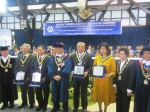DIW Berlin Climate Policy Researcher at ITB PPI Symposium: Exploring Lessons from Just Energy Partnerships in South Africa
By M. Naufal Hafizh, S.S.
Editor M. Naufal Hafizh, S.S.
BANDUNG, itb.ac.id - The Climate Change Center at Institut Teknologi Bandung (PPI ITB) organized a Climate Change Center Symposium with the theme "Post COP28 UNFCCC: Reflections on Climate Governance in a Just Energy Transition in Indonesia," held at the Conference Hall, CRCS Building, ITB Ganesha Campus on Thursday (14/12/2023).
The symposium featured several expert speakers, including Dr. Heiner Von Leupke, a researcher from DIW Berlin's Climate Policy Department. He delved into the challenges and insights from the just energy partnership in South Africa, seeking connections to similar processes in Indonesia.
His presentation addressed the differences in perspectives between groups of international actors associated with global climate finance and local actors. Dr. Von Leupke noted that international funders typically focus on climate mitigation, while local actors hold diverse views, including considerations of social justice.
He explained the findings of a case study on the Just Energy Transition Partnership (JETP) in the South African energy sector. "This project, backed by multinational funds totaling 8.5 billion US dollars, was announced during COP26 in Glasgow," he stated. Based on interviews with international and local groups, it was concluded that fostering increased trust is essential for successful collaboration.
One key insight revealed two primary levels of collaboration: first, an international agreement between the President of South Africa and international donors, and second, the domestic transition level involving various groups with differing views on the energy transition's direction.
Dr. Von Leupke also emphasized the critical importance of clarity regarding project ownership. In situations where groups hold divergent views, determining actual ownership becomes a crucial question. "Therefore, building trust between international and local groups is paramount in supporting a just transition," he asserted.
He highlighted that achieving effective cooperation requires a profound understanding between the two groups. "International collaboration within the domestic policy process demands open communication, a willingness to discuss challenges, and a commitment to comprehending the perspectives and strategies of each party," he concluded.
Reporter: Hafsah Restu Nurul Annafi (Urban and Regional Planning, 2019)
Translator: Hanifa Juliana (Urban and Regional Planning, 2020)
Editor: Anggi Nurdiani (Management, 2024)

.jpg)
.png)
.jpg)
.jpg)
.jpg)



